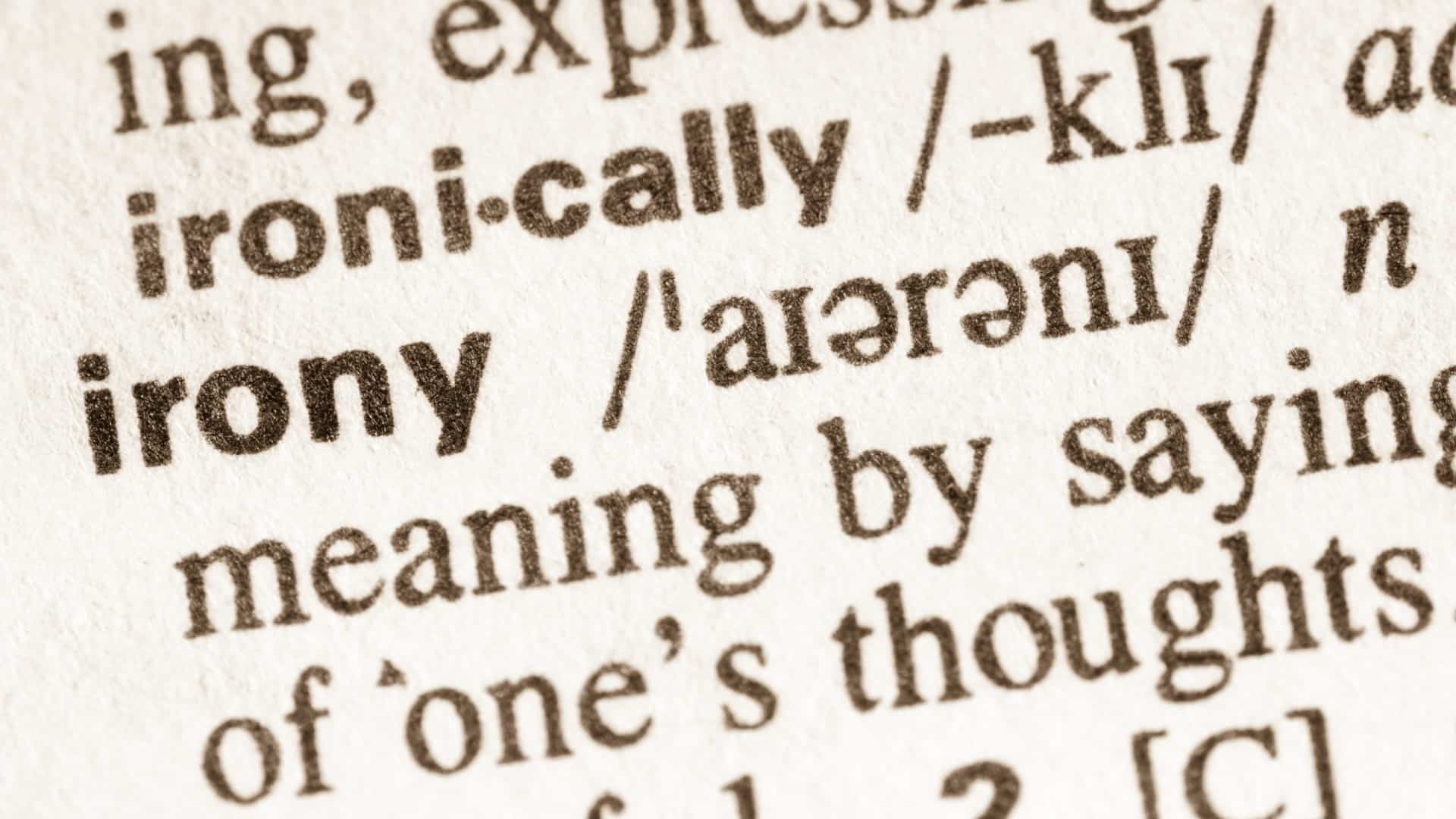
All You Need To Know About Irony

A little over a month ago, one of my teeth broke while I was flossing. It was an unexpected outcome because flossing is supposed to help keep your teeth healthy. That’s irony. When my tooth broke, it was the Friday night of a holiday weekend, and since I wasn’t bleeding or in excruciating pain, I knew there was no chance of getting a dental appointment until Tuesday at the earliest. That was an unfortunate coincidence, but it was not ironic.
Irony is a complex concept that many people misunderstand. Unfortunately, this doesn’t prevent them from using the term incorrectly, with the consequence that it can be difficult to determine whether something is truly ironic or not. I believe it is healthy for writers to exercise some caution in using the term and to periodically refresh ourselves about what it really means.

Irony Definition
Irony is a figure of speech that a writer uses to show a contrast between the reality of a given situation and the expectations of either the audience or the characters in the story. Irony can be used for either comedic or dramatic effects.
Irony Meaning
There are several different types of irony, but what they all have in common is a striking reversal of intentions or expectations. The three main types of irony are verbal irony, dramatic irony, and situational irony.
What Is Verbal Irony?
Of the three main types of irony, verbal irony may be the most straightforward. It simply means a statement in which the writer’s or speaker’s meaning is the opposite of his or her words. For example, if you said, “Boy, look at the crowd,” when walking into an empty stadium, or “Let’s not all talk at once,” when standing before a quiet group, those would be examples of verbal irony.
A sarcastic statement is ironic by definition, but just because a verbal statement is ironic does not automatically mean that it is sarcastic. Sarcasm requires an element of mockery, either towards oneself or someone else, that is not required for a statement to be merely ironic. For example, to say that something is “as clear as mud” is an ironic statement expressing confusion, but unless it is said in a mocking tone of voice, it is not sarcasm.
What Is Dramatic Irony?
In literature, dramatic irony occurs when the audience knows something that the characters in the story do not. It creates a sense of suspense and sympathy with the characters because we, the audience, know what is going to happen and how the character is going to feel when the truth is revealed.
Dramatic irony is also known as tragic irony because it was frequently employed in tragedies by ancient Greek playwrights. For example, in “Oedipus Rex” by Sophocles, the audience knows that the title character’s attempts to avoid the prophecy that he would kill his father and marry his mother have actually brought it to fruition long before Oedipus figures it out.
However, dramatic irony can also be used for comic effect. An example is a scene from “There’s Something About Mary” in which Ben Stiller’s character is being questioned by the police as part of a murder investigation, but he thinks they’re talking about picking up hitchhikers.
What Is Situational Irony?
Situational irony involves an outcome that is a reversal of the audience’s expectations and often the expectations of the characters in the story as well. A frequently cited example is the end of “The Gift of the Magi” by O. Henry. The husband and wife each sell the possession that is the most precious to them to buy a gift for the other, only to find out that the loss of the possessions renders the store-bought presents useless.
Situational irony is the type that people frequently get wrong, using “ironic” to describe something that is merely coincidental. To qualify as ironic, the circumstance has to involve a striking reversal of expectations. Therefore, as multiple comics have pointed out, the situations that Alanis Morrissette describes in the lyrics to “Ironic” are merely coincidental or unfortunate, but the fact that she sold a hit song about a word that she couldn’t define is ironic. Yeah, I really DO think … that she oughtta know.
Irony Examples
There are many examples of each of the main types of irony from both classic literature and popular culture. Like the ancient Greek playwrights from whom Shakespeare took inspiration, he uses irony to great effect in his tragedies. For example, in “Othello,” the audience knows that Iago is untrustworthy, but the title character does not. In “Romeo and Juliet,” Romeo takes poison thinking Juliet is dead, only to have Juliet wake up to discover Romeo’s lifeless body.
Other examples of irony include the following:
- Dramatic Irony: The title character in “Finding Nemo” pretends to be dead. The audience knows that he’s faking, but the dentist doesn’t.
- Situational Irony: In “Ozymandias,” a poem by Percy Bysshe Shelley, a traveler in the desert finds a giant statue that has collapsed into pieces with only the legs standing on a pedestal with a message that reads, “Look on my works, ye Mighty, and despair!”
- Verbal Irony: For nine years during “The Colbert Report” on Comedy Central, Stephen Colbert played a character mimicking conservative news pundits in order to poke fun at them. (Verbal irony is a staple of political satire.)

Irony Ambiguity
When trying to determine whether a situation is truly ironic, it helps to look for the reversal of original expectations. Nevertheless, sometimes it is genuinely difficult to determine whether a situation qualifies as irony or not. For example, is it ironic that F. Scott Fitzgerald was paid $5,500 for a picture job that cost him over $4,000 in medical attention? He still made a profit, so … maybe not? Without knowing more about what expectations he had going into the job, it is difficult to say.
Do you have difficulty remembering the definition of irony? Does it bother you when other people use the term incorrectly? Let us know in the comments.
- Commonly Confused Words: All Ready vs. Already - May 25, 2023
- Enhancing Readability With the Flesch-Kincaid Score - April 29, 2023
- Red Flags To Look For in Work-From-Home Writing Jobs - December 14, 2022


